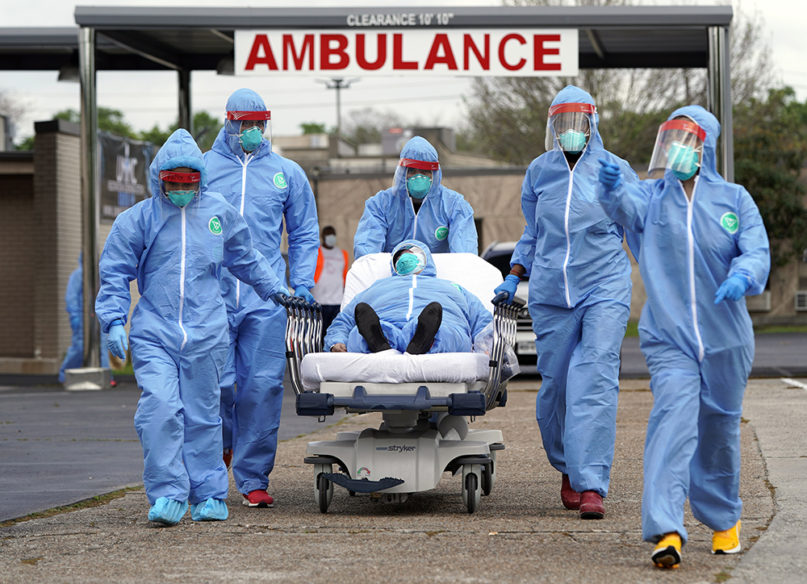If you’re like me, during the past few weeks you have alternated between obsessively reading the news and pointedly avoiding it in order to attend to self-preservation in the form of cat memes. You have moved between a sense that nothing is normal and a sense that nothing could possibly be wrong—not here, not really, not to this unthinkable scale.
We are living in an apocalypse, so I imagine such whiplash is normal.
Notice I didn’t say “the” apocalypse. No definite article. This is not the end of days (though Wednesday’s earthquake in Utah, which caused the Angel Moroni’s trumpet to come tumbling down from its perch atop the Salt Lake Temple, might make folks wonder). This is an apocalypse.
My husband’s Episcopal rector, Philip DeVaul, explained the difference pretty handily in a column to the congregation this week.
We’re trained to think that Apocalypse means the end of the world, or the end of civilization. But apocalyptic literature – whether it be the Book of Revelation or a zombie movie – has an explicitly different purpose. The word “apocalypse” means “to reveal.”
The apocalyptic genre is about revealing. But it’s not revealing the future—it’s not a crystal ball—it’s revealing something that is already true about us. It’s revealing things about our culture we don’t want to admit.
The coronavirus is already shining a light into some dark places, both in the US and the world. Here, it’s revealing the problem of income inequality, which becomes apparent when Hollywood stars and basketball players can get tested for the illness before ordinary people who are already exhibiting symptoms. And we’ve only realized there’s a problem with the way we pay grocery store clerks now that their lack of paid sick leave has begun to threaten other people’s very lives. And on and on.
This is an apocalypse. It will help to reveal who we are individually. And for the Mormon people, how we respond to this moment will define our identity going forward.
There are a couple of ways we can do this. The first is the “hunker and bunker” mentality. This mode is characterized by admirable preparation coupled with strident self-congratulations, as we aim to let the whole world know our beloved prophet saw this coming. We aren’t a people to be caught with our pantries down. We are a people who saved for a rainy day, who continued canning own tomatoes even during the 1980s and 1990s, which was after it was actually necessary but before it became artisanally cool.
And because our prophet moved us a year and a half ago to a more “home-centered, church-supported” model for Christian living, we’re better prepared than most to handle the disruption of not meeting congregationally for months on end. We have our Come Follow Me curriculum and our reading assignments, after all, so that every church member in the world knows which passages of scripture to study and discuss in a given week.
I’m not saying this move wasn’t inspired; I’m saying this is hardly the time to crow about it. If you’re a Latter-day Saint who thinks the decision was inspired because the Lord was interested in saving you and your family, full stop, you’ve entirely missed the point.
The point was to save everybody. The point is always to save everybody.
Which brings us to the second mentality, which is to “tend and befriend.” Whereas the “hunker and bunker” approach focuses on scarcity and the idea that there’s only so much to go around—whether the scarce resource is toilet paper, which is humorous, or ventilators and masks, which is decidedly not—the “tend and befriend” attitude understands that resources exist to be shared and not hoarded. That we’re all in this together, dealing with an apocalypse for which we are all unprepared, no matter how many vacuum-sealed packs of dried carrots we’ve got in the back of the closet.
What is perhaps most poignant to me about this coronavirus is how naked and vulnerable we all stand in the face of it. All of us. No one appears to have immunity from prior exposure, and no one has been vaccinated. In terms of apocalypses that reveal who we really are, here’s a stark image: this particular apocalypse is revealing that we’re every bit as helpless as we were when we emerged from our mothers’ wombs.
Instead of allowing that to make me afraid, I want to allow it to break me open and help me become something more than I would otherwise be. I am a helpless infant, yes, but a helpless infant who is beloved of heavenly parents who desire the flourishing of all their children.
Such transformations are easier said than done. While I can see the flaws in the “hunker and bunker” mentality, it’s definitely my safe zone, the baseline. It represents what the Book of Mormon calls the “natural man”—which is me with all my selfishness, my fear of the future, and my need to be right.
The second represents the Latter-day Saint I want to be, the one who has faith in abundance and love. Every day during this crisis, I will endeavor to be that person.
Related posts about the coronavirus:
- Prepping for coronavirus the Mormon way
- Dear Mormons, please take coronavirus seriously
- The problem of ‘social distancing’ for women who already do too much






